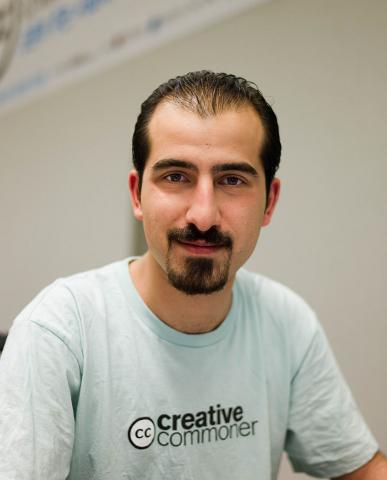
Freedom of expression activist Bassel Khartabil was executed soon after his disappearance from Damascus’ Adra prison on October 3, 2015, his widow has confirmed.
Named by Foreign Policy as one of its Top 100 Global Thinkers of 2012, and recipient of the Index on Censorship’s 2013 Digital Freedom award, Khartabil was “credited with opening up the internet in Syria – a country with a notorious record of online censorship – and vastly extending online access and knowledge to the Syrian people.”
Alkarama’s thoughts are with his family, and we mourn the loss of the cyberactivist who was deeply committed to supporting freedom of expression and opening up the web in his country.
Activism and detention
Palestinian-born Khartabil was the co-founder of Aiki Lab, a youth community technology space or “hacker space,” which he was running at the time mass protests broke out against Bachar Al Assad’s regime in 2011.
The technology professor and software engineer was a committed advocate of supporting open web technologies and free internet by building knowledge of digital literacy and education about social media and open-source tools across the Arab world.
As he was leaving work in the Mezzeh district of Damascus on March 15, 2012, Khartabil was arrested by members of the Military Intelligence and taken to an unknown location. A week later, security forces brought Khartabil home to carry out a search of his property. His family later lost contact with him for nine months.
When Khartabil’s family made contact with him on December 26, 2012, they found him psychologically traumatised and in poor physical condition after suffering severe torture and having been held in solitary confinement at Adra prison.
Following nine months of secret detention, a military prosecutor charged Khartabil with “spying for an enemy State” under articles 272 and 274 of the Syrian Criminal Code, and referred the case to a military court.
On October 3, 2015, while still awaiting trial, Khartabil was transferred from Adra prison, disappearing from official records. Khartabil’s wife, Noura, learned about his transfer from other prisoners, but authorities refused to provide her with any information on his whereabouts.
UN calls for his release
Alkarama initially referred the case of Bassel Khartabil to the UN Working Group on Arbitrary Detention (WGAD) in September 2014. In April 2015, the WGAD adopted an Opinion which considered his detention “arbitrary” and called for his immediate release. However, the Syrian authorities did not implement the UN recommendations, and Khartabil remained detained at Adra prison.
After Khartabil’s disappearance in 2015, Alkarama seized the United Nations Working Group on Enforced or Involuntary Disappearances (WGEID), which called upon the Syrian authorities to disclose his whereabouts and allow his family visiting rights. Syria never responded to the UN group.
On August 1, 2017, Khartabil’s wife announced that he had been executed soon after his disappearance on October 3, 2015. Khartabil would have been 34-years-old at the time.
In a Facebook post on Tuesday, Noura Ghazi Safadi announced, “the order to execute my husband Basel Khartabil was carried out days after he was moved to the Adra prison in October 2015 – an appropriate end for a hero like him.” The Russian embassy in Damascus confirmed that Bassel Khartabil was executed at this time.
To this day, Syrian authorities have not confirmed his death, and have not returned his body or presented a death certificate to the family.
For more information or an interview, please contact media@alkarama.org (Dir: +41 22 734 1008).
